Daily Living Aids
Regulatory Updates and Professional Standards
In the ever-evolving landscape of health and therapy, keeping up with the latest regulations, standards, and best practices is crucial for professionals committed to providing the highest level of care. This is particularly true when it comes to the use of disability aids. In this blog, we'll explore some recent regulatory updates, emerging professional standards, and best practices in the industry that you need to know.
The Importance of Staying Updated
Regulatory bodies continuously update their guidelines to ensure that healthcare products, including disability aids, meet the highest safety and efficacy standards. For professionals in the health and therapy sectors, staying informed about these changes. Compliance ensures that your products and services are safe, reliable, and practical, crucial for patient well-being and trust.
Recent Regulatory Updates
Post-Brexit CE Marking Adjustments
The UK's departure from the EU has led to significant changes in the regulatory landscape, particularly concerning CE marking. Now, disability aids in the UK require the UKCA marking (UK Conformity Assessed) to be sold legally. This shift necessitates that manufacturers and distributors of disability aids ensure their products comply with the new UK standards. Professionals need to verify that the aids they recommend or provide are properly certified.
 ISO Standards for Assistive Products
ISO Standards for Assistive Products
The International Organization for Standardization (ISO) periodically revises its standards for assistive products, ensuring they meet the latest technological advancements and safety requirements. The ISO 9999 classification, for example, is regularly updated to include new categories of assistive devices and refine existing classifications. Staying informed about these changes can help professionals recommend the most current and effective products to their clients.
Health and Care Professions Council (HCPC) Guidelines
The HCPC, which regulates health and care professionals in the UK, has updated its guidelines to emphasise the importance of continuous professional development in line with new standards and practices. For those specialising in occupational therapy, physiotherapy, or any field involving disability aids, adhering to these guidelines ensures that your practice remains aligned with the latest professional standards.
Emerging Best Practices in Disability Aids
Emphasising Individualised Care
The trend towards personalised medicine has reached the realm of disability aids, with a growing emphasis on tailoring products to individual needs. This approach improves patient outcomes and aligns with regulatory expectations for patient-centred care.
Sustainable and Ethical Practices
Sustainability is key in manufacturing and using disability aids. Professionals should be aware of products made from eco-friendly materials and companies that prioritise ethical manufacturing practices. Not only does this align with broader societal goals, but it also resonates with increasing clients who are conscious of their environmental footprint.
Integration of Smart Technology
Integrating intelligent technology into disability aids is an exciting development, offering enhanced functionality and greater user independence. Professionals should familiarise themselves with the latest intelligent aids, from sensors that monitor usage patterns to apps that allow for remote adjustments, ensuring they can have the familiar solutions for their clients.
Keeping up with regulatory updates and professional standards is essential for any health or therapy professional who works with disability aids. By staying informed, you not only ensure compliance but also enhance the quality of care you provide to your clients. The landscape is constantly changing, but with a commitment to learning and adaptation, you can remain at the forefront of your field, providing the best possible support to those who rely on your expertise.
Innovative Therapy with Tenura: Silicone Aids for Better Rehab
Innovative Therapy Techniques with Disability Aids
Innovation is key to enhancing patient outcomes and improving quality of life in therapy and rehabilitation. Silicone-based disability aids, such as those offered by Tenura, are making significant strides in this area. These aids are versatile and durable and play a crucial role in daily living and rehabilitation. This blog explores how Tenura’s silicone products can effectively integrate into therapy and rehabilitation, offering support during and after recovery.
The Benefits of Tenura Daily Living Aid Products
Tenura’s silicone aids are designed to assist individuals in various rehabilitation and daily living stages. Here’s how these products can benefit users:
1. Supporting Daily Activities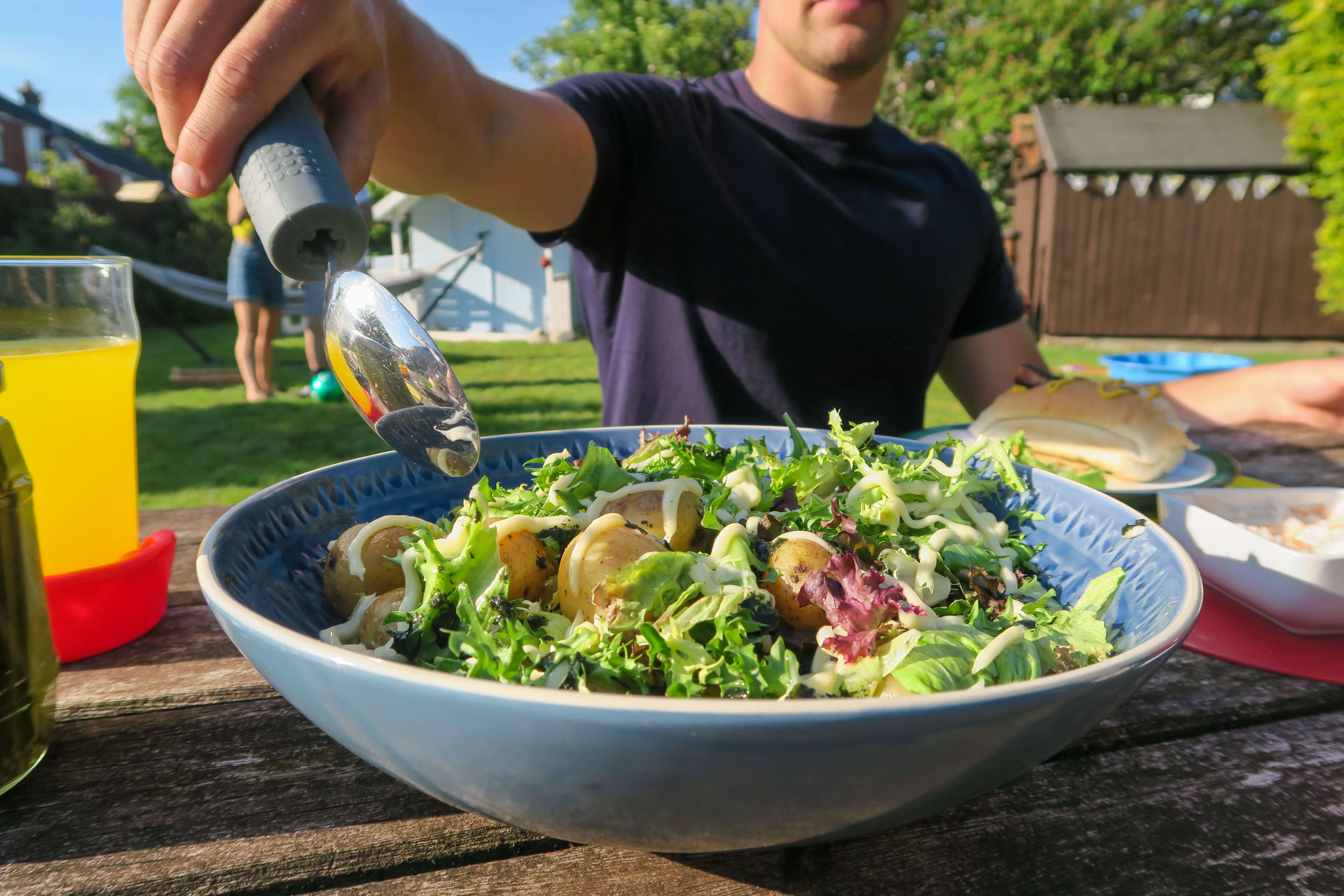
Tenura’s daily living aids, such as non-slip mats, jar openers, and ergonomic grips, offer practical support for everyday tasks. These aids help individuals with limited dexterity or strength perform activities like cooking, cleaning, and dressing more easily. By integrating these products into daily routines, users can maintain independence and improve their quality of life.
2. Enhancing Motor Skills Development
During rehabilitation, Tenura’s silicone aids provide valuable support for motor skills development. Products like cutlery grips are designed to strengthen muscles, improve coordination, and enhance fine motor skills. These aids can be used in various therapeutic exercises, helping individuals regain functionality and confidence in their abilities.
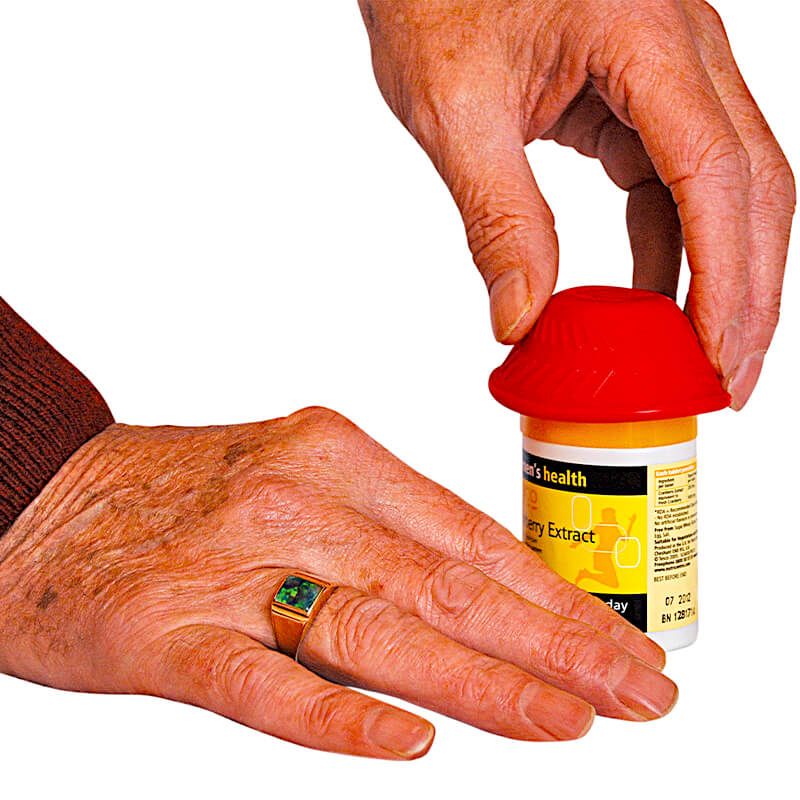 3. Providing Comfort and Pain Relief
3. Providing Comfort and Pain Relief
Comfort is a crucial aspect of rehabilitation, and Tenura’s silicone aids offer solutions for pain management and comfort. Making everyday tasks more accessible with the jar openers can help reduce pain. Our daily living aid products help enhance overall comfort during the rehabilitation process.
4. Facilitating Assistive Technology Use
Tenura’s silicone aids are designed to complement assistive technology, making it more accessible and user-friendly. Silicone grip strips can improve the usability of adaptive devices, such as controllers and communication tools, ensuring that individuals with limited dexterity can use technology effectively.
Long-Term Benefits of Tenura Products
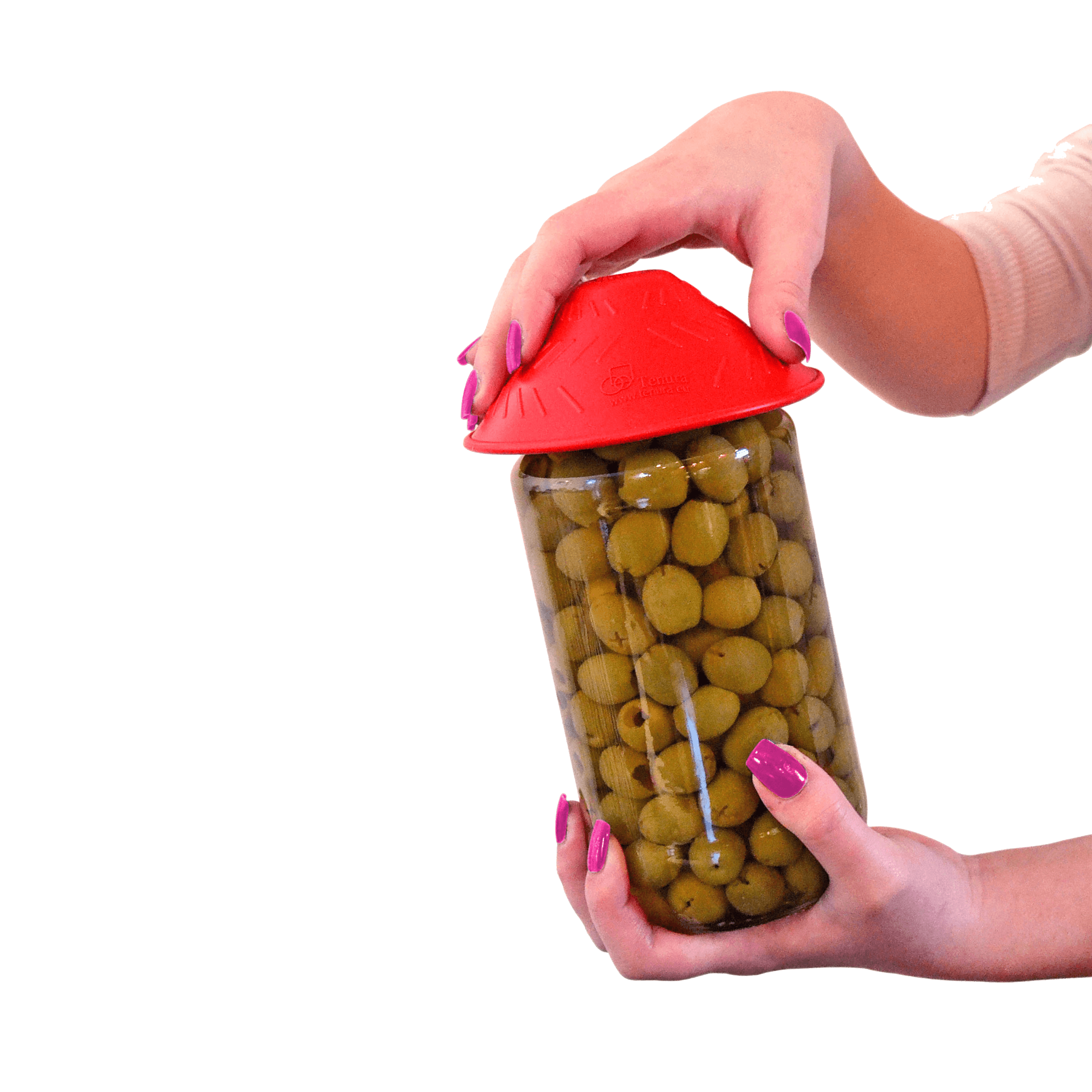 Sustained Independence
Sustained Independence
By integrating Tenura products into daily routines and therapy, individuals can enjoy long-term benefits such as sustained independence and improved self-care capabilities. These aids support users in performing everyday tasks with greater ease, promoting a sense of autonomy and confidence.
Enhanced Quality of Life
Tenura’s silicone aids contribute to an enhanced quality of life by addressing both practical and therapeutic needs. The combination of functional support and therapeutic benefits helps individuals maintain their lifestyle and well-being during and after rehabilitation.
Ongoing Support
Tenura products provide ongoing support beyond the rehabilitation phase, helping individuals adapt to changes in their abilities and maintain their independence. The durability and versatility of these aids ensure that they continue to be valuable tools throughout a user’s journey.
Tenura’s innovative silicone aids transform therapy and rehabilitation by offering practical support, enhancing motor skills and providing comfort. These products play a vital role in daily living and long-term well-being, helping individuals maintain independence and improve their quality of life. For more information on how Tenura’s daily living aids can support you or your patients, contact us today and discover the benefits of our versatile daily living aids.
Kitchen Innovations Cooking with Tenura Aids
In today's modern kitchen, efficiency, safety, and accessibility are essential for creating a pleasant cooking experience. Tenura's innovative range of daily living aids is designed to meet these needs, offering practical solutions that enhance comfort, promote independence, and improve overall kitchen functionality. Whether you're a professional chef, a passionate home cook, or someone with specific mobility challenges, Tenura products are crafted to make kitchen tasks easier and more enjoyable.
Enhancing Kitchen Accessibility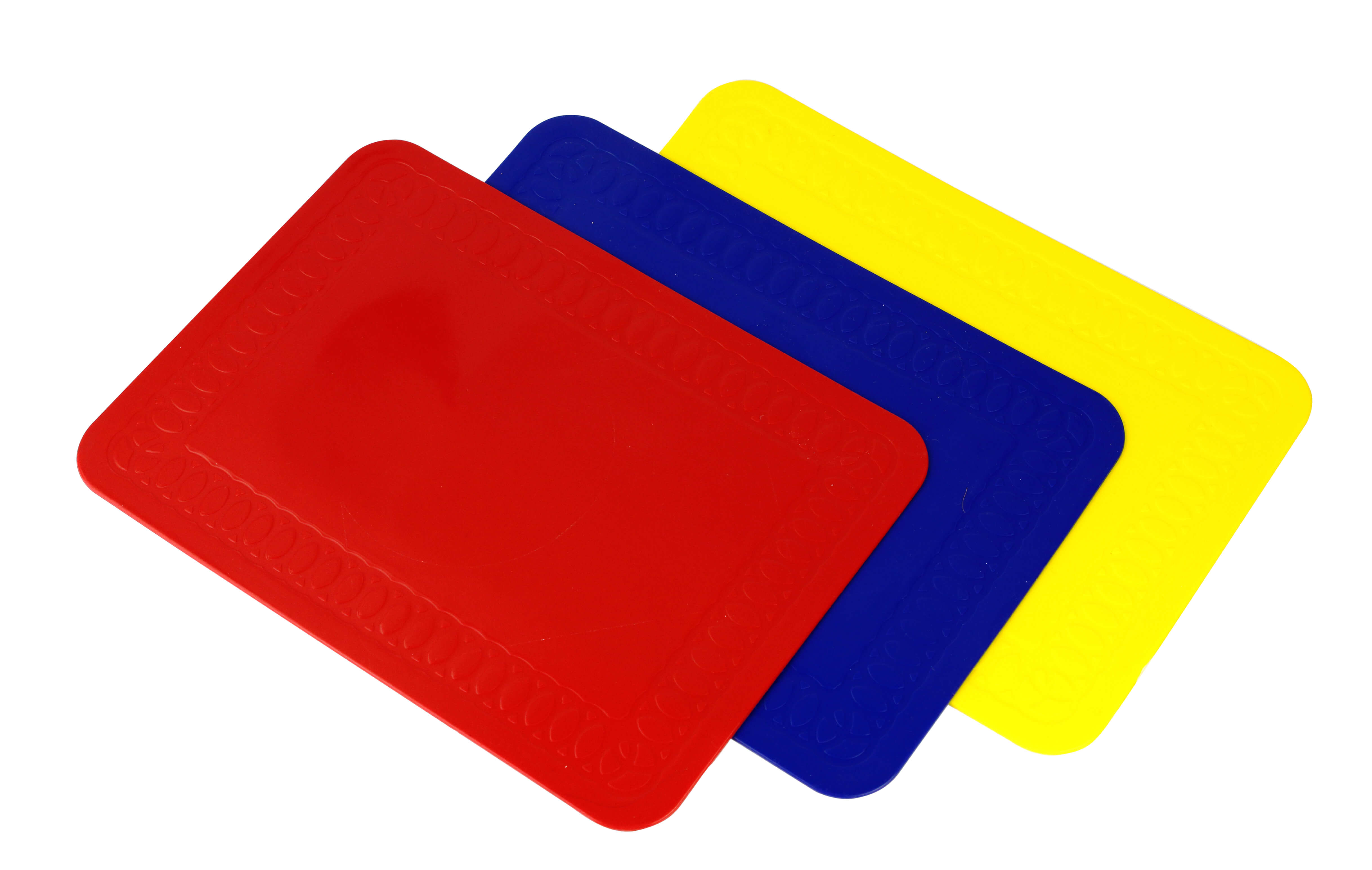
Tenura's non-slip mats and grip aids are crucial in maintaining stability and control during food preparation. These silicone-based mats adhere firmly to countertops, preventing items like cutting boards, bowls, and kitchen utensils from sliding or shifting. The heat-resistant properties of Tenura mats make them ideal for placing hot pots, pans, and dishes, ensuring safety while cooking. This stability enhances safety and boosts efficiency by allowing cooks to focus on their food without worrying about items slipping or moving unexpectedly.
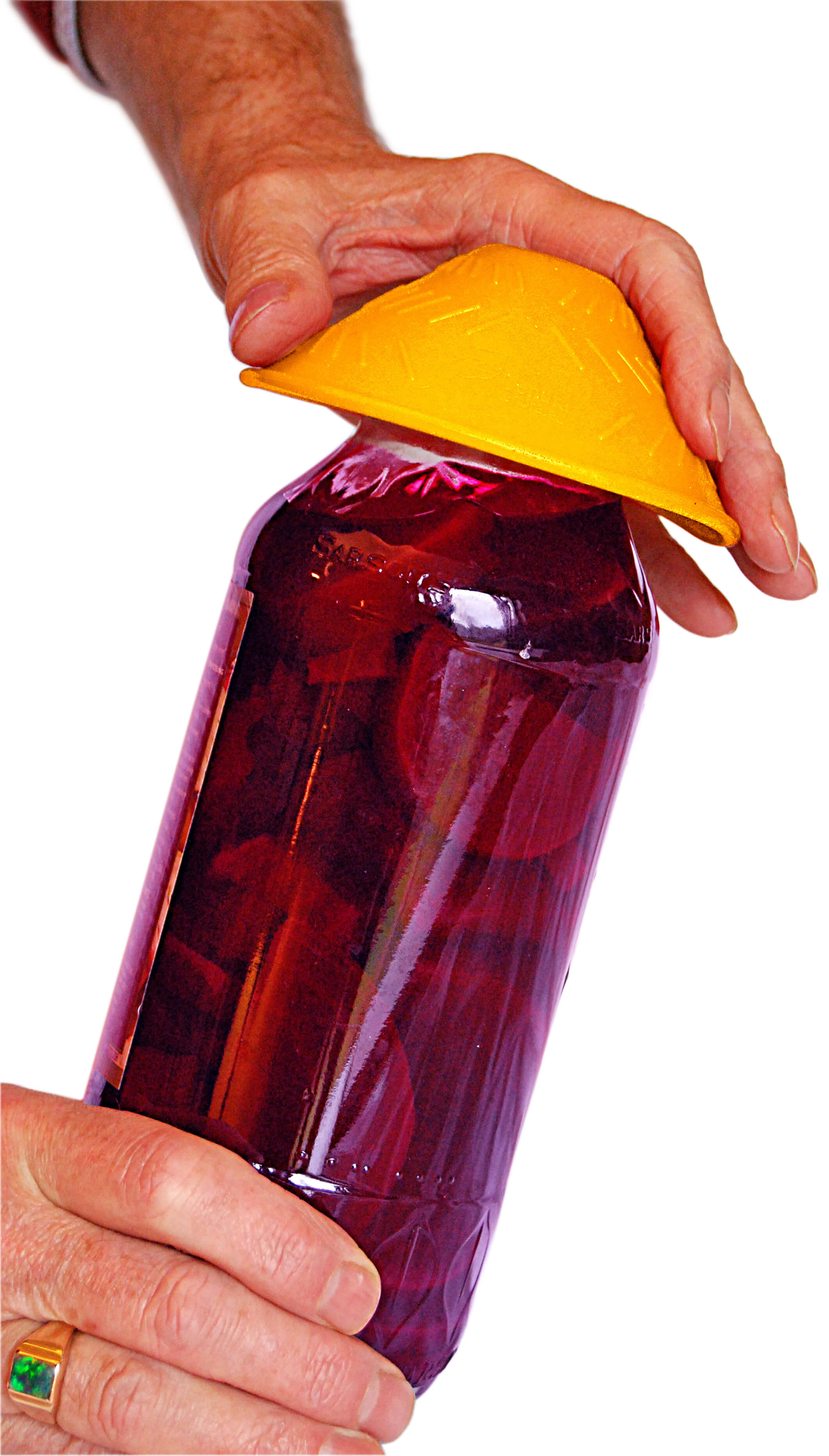 Supporting Comfort and Ergonomics
Supporting Comfort and Ergonomics
Cooking often involves repetitive motions and grip-intensive tasks, which can strain muscles and joints, especially for individuals with limited dexterity or strength. Tenura's jar openers and grip enhancers solve common kitchen challenges ergonomically. These aids help users effortlessly open bottles, jars, and containers of various sizes, reducing strain and discomfort. Tenura products enable users to maintain independence and enjoy cooking activities with greater ease by promoting a more comfortable grip and reducing the effort required for everyday tasks.
Promoting Safety in the Kitchen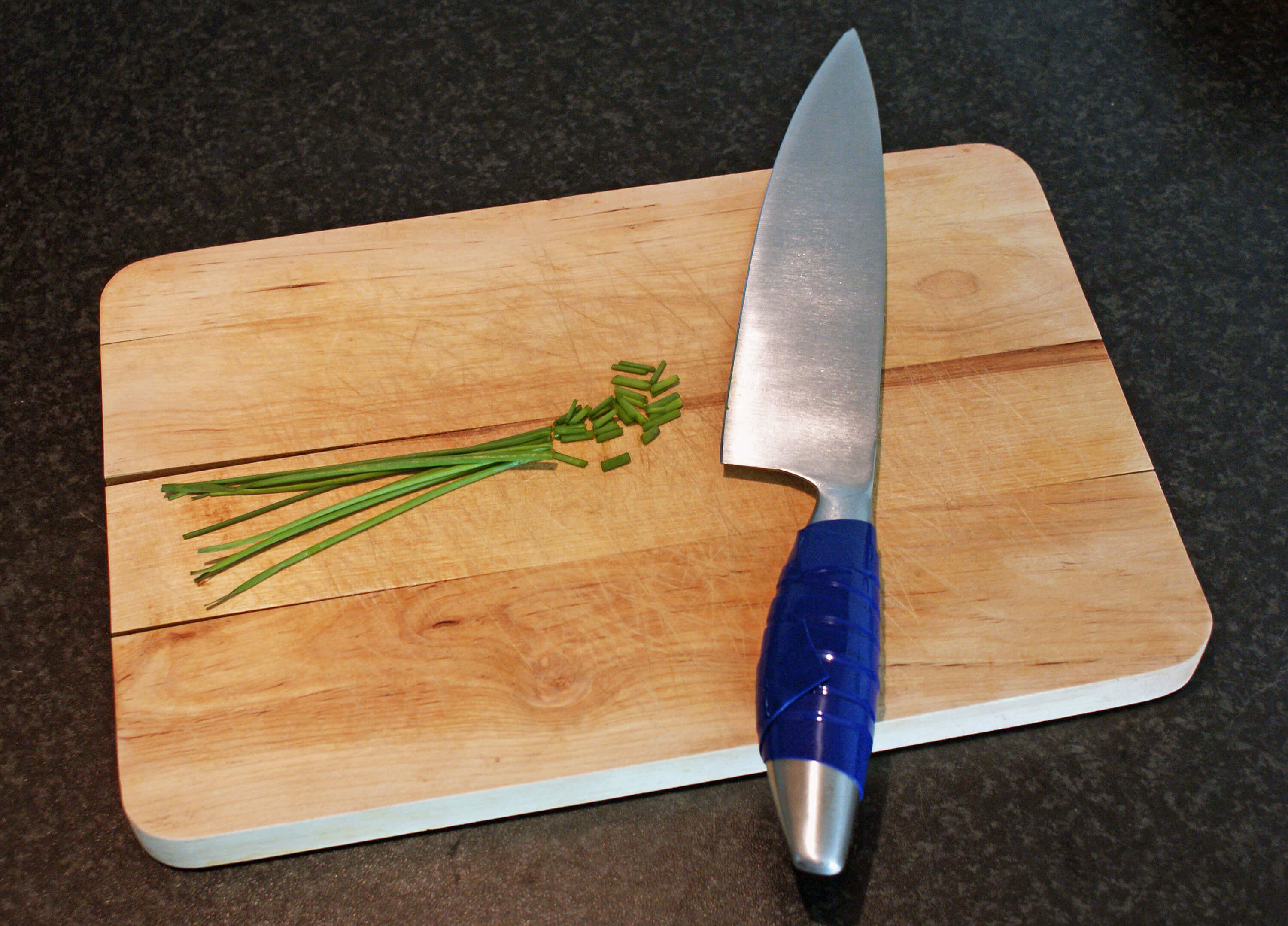
Safety is paramount in any kitchen environment. Tenura's anti-slip grip strips and coasters are designed to enhance safety by providing additional stability to utensils, small appliances, and tableware. These discreet yet effective solutions minimize the risk of accidents such as spills and slips, which are particularly useful in high-traffic areas of the kitchen where spills are more likely. By securing items firmly in place, Tenura products contribute to a safer cooking environment, giving users peace of mind as they go about their daily cooking routines.
Practical Applications and User Testimonials
The versatility of Tenura daily living aids extends beyond basic functionality, impacting users' lives in meaningful ways. Real-life applications demonstrate how these products have transformed kitchens globally, providing independence, improving efficiency, and enhancing overall quality of life. User testimonials highlight the positive impact of Tenura products, showcasing personal experiences of increased confidence, improved safety, and greater enjoyment in everyday cooking tasks.
Embracing Kitchen Innovations
Tenura daily living aids are more than just tools; they are innovations that empower users to embrace their culinary creativity while overcoming physical challenges. Whether you want to improve grip strength, enhance safety measures, or make cooking more comfortable, Tenura offers reliable solutions tailored to diverse needs. From professional kitchens to home settings, Tenura products are designed to foster independence and enhance the kitchen experience for users of all abilities.
As kitchen tools often change to meet the demands of modern living, Tenura remains at the forefront of innovation with its range of high-quality daily living aids. Integrating these products into your kitchen routine can enhance safety, improve efficiency, and enjoy a more comfortable cooking experience. Explore the full range of Tenura products today to learn how they can transform your kitchen into a space where independence and accessibility thrive.
Innovating Safety with PVC and Phthalate-Free Products
On the news this week was an interesting article concerning dangerous phthalate use in cricket balls and that they have been pulled from distribution due to safety concerns.
All our disability aids are healthy alternatives to phthalate products. Our coasters, mats, jar openers, bottle openers and cutlery grips, are 100% phthalate free. When we created the Tenura brand and products, we wanted something that was the future and anticipated the movement towards a PVC-free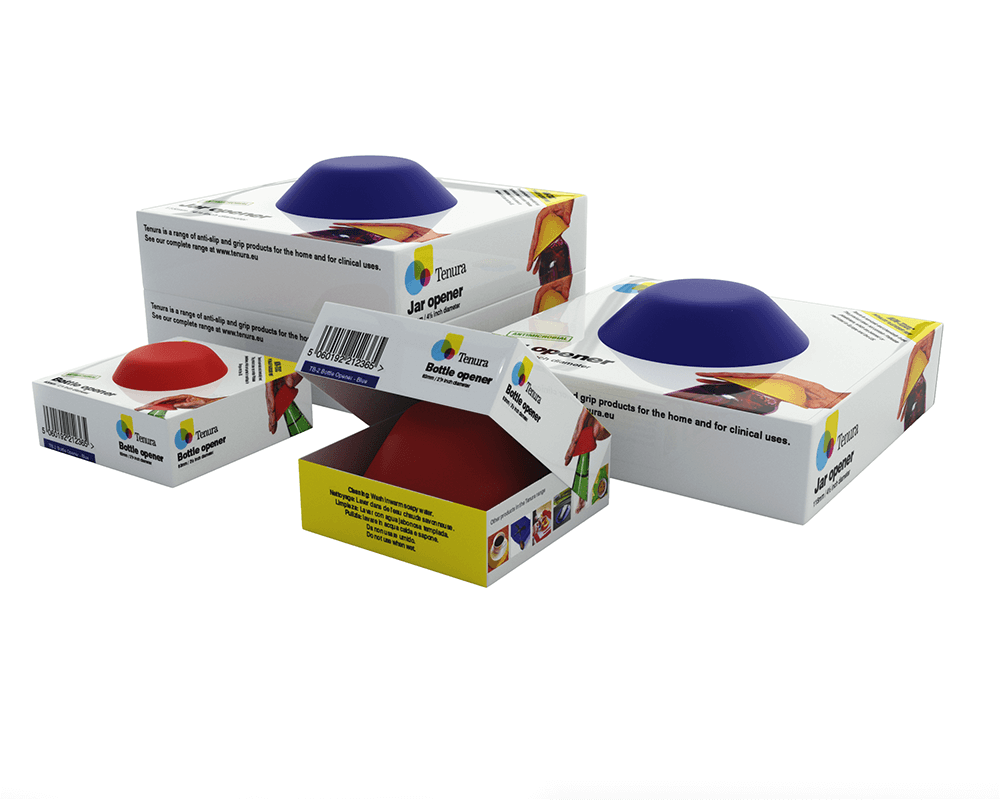 and phthalate-free time. Although PVC is still the world’s third most popular plastic, there is a movement away from it. Apart from the Tenura range all of the gripping aids, mats and coasters seen on the market are simply cheap PVCs that are rammed with phthalates and plasticisers, the products that we commonly compete against cannot be used around children and cannot be used in states such as Oregon or California.
and phthalate-free time. Although PVC is still the world’s third most popular plastic, there is a movement away from it. Apart from the Tenura range all of the gripping aids, mats and coasters seen on the market are simply cheap PVCs that are rammed with phthalates and plasticisers, the products that we commonly compete against cannot be used around children and cannot be used in states such as Oregon or California.
The high levels of phthalates and plasticisers provide the grip as the chemicals make the PVC soft (the ‘U’ in UPVC windows is ‘Unplasticised’, meaning that without the plasticisers then a PVC jar opener etc would be a hard solid lump of plastic), the plasticisers keep making the PVC soft until they eventually leave the product leaving it hard, or at least having no grip properties. The manufacturers will claim they are not PVC but ‘a unique plastic that does not exist anywhere else’; no, they are really cheap PVC products, and their grip comes from the phthalates. When a PVC feels grippy or has hold, it simply means that large amounts of phthalates are leaving the product and are they coated on your skin, which you then pass around, you touch your mouth, you touch your food and ingest them. The PVC films they mention 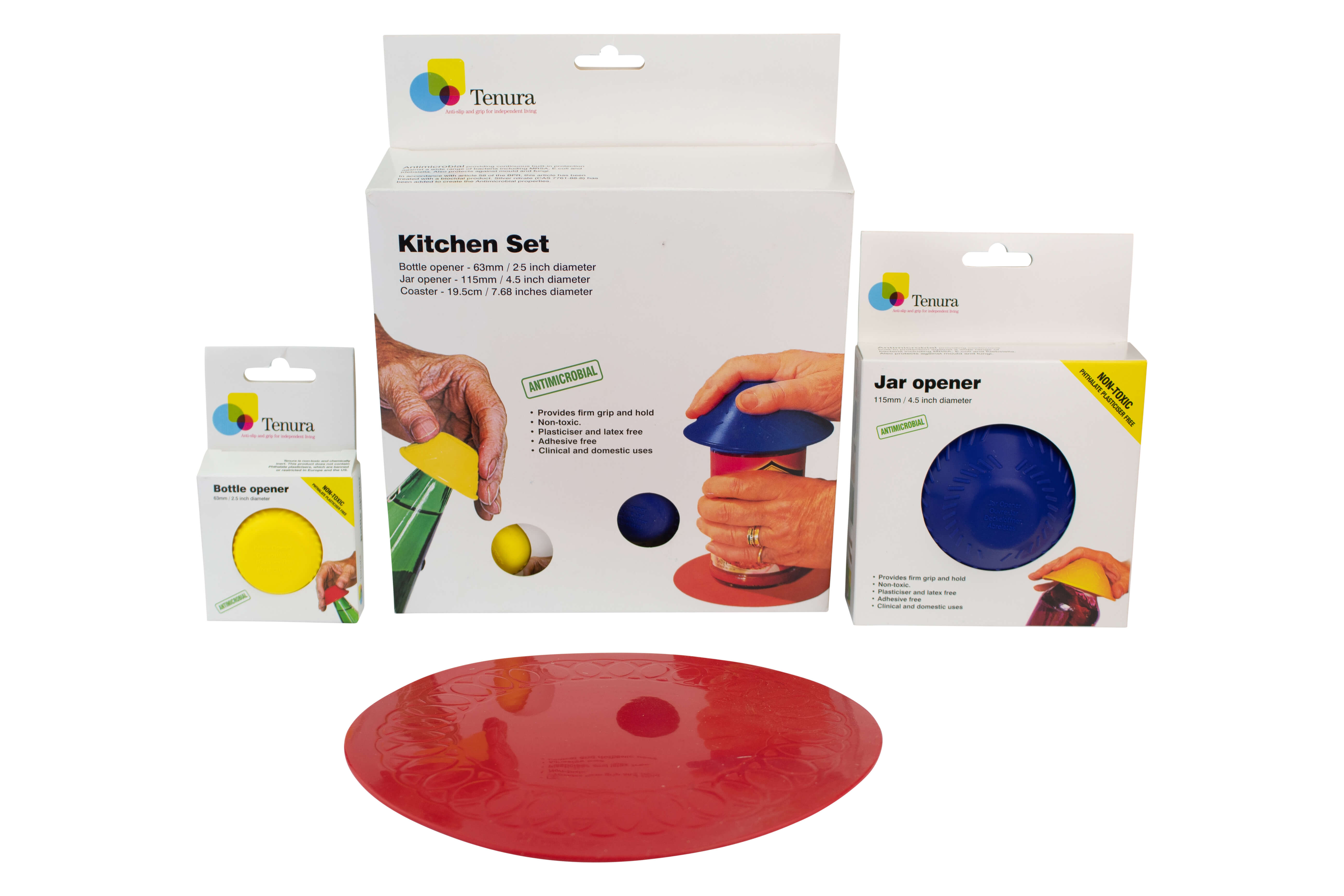 are so restricted they cannot be around food or as mentioned, children due to safety. Yet companies still use and will dare not mention that they are PVCs with very high levels of phthalates. As mentioned the grip in competing materials comes from the phthalates leaving the PVC mat or coaster and then making it very soft. Eventually large quantities of the phthalates have left the PVC meaning that it no longer has sufficient grip, many of these phthalates will have left and passed to your skin.
are so restricted they cannot be around food or as mentioned, children due to safety. Yet companies still use and will dare not mention that they are PVCs with very high levels of phthalates. As mentioned the grip in competing materials comes from the phthalates leaving the PVC mat or coaster and then making it very soft. Eventually large quantities of the phthalates have left the PVC meaning that it no longer has sufficient grip, many of these phthalates will have left and passed to your skin.
Tenura does not have any of these problems. Tenura uses 100% PVC, phthalate and plasticiser free materials, our compounds can be used for children’s toys, around food, can be sold in all US states and are completely inert. Offering a wide range of PVC-free solutions for home safety!
If you want something that you know is 100% safe for you, your children and will continue functioning the same in years to come as it does from the start then the Tenura range is the only viable material.
What are the harmful effects of phthalates?
Phthalates, commonly found in various products, have been linked to various health concerns. Having regular exposure to phthalates has been associated with hormonal disruption, reproductive issues, developmental problems in children, and increased risk of asthma and other allergies. Additionally, some studies show a potential link between phthalate exposure and certain cancers. It's important to minimise exposure to phthalates, especially for pregnant women and young children. Opting for phthalate-free products like those offered by Tenura can help mitigate these risks.
Unlike competing products we are happy t provide certification, safety documentation, detailed data sheets (ones showing construction not simply avoiding what the plastic or referring to it as a ‘Trade secret’) and all information required. We are always happy to help.
Improving Rehabilitation with Tenura’s Products.
Physical therapy and rehabilitation play a crucial role in enhancing the lives of individuals recovering from injuries, surgeries, or managing chronic conditions. Occupational therapists and healthcare professionals often seek innovative and effective solutions to support their patient's recovery journey. In this blog, we'll explore how Tenura's range of anti-slip and grip products can be valuable tools for physical therapists and their patients, promoting safety, mobility, and independence during rehabilitation.
Tenura Grip Rolls
Secure Support for Therapeutic Exercises Tenura's grip rolls offer a versatile solution for physical therapists. These non-slip rolls can be cut to custom lengths and used to stabilise exercise equipment, therapy mats, and seating surfaces. By providing a secure grip, grip rolls enable patients to focus on their therapeutic exercises without worrying about slips or instability. Whether used under yoga mats during balance exercises or beneath resistance bands for strength training, grip rolls offer reliable support for targeted workouts.
 Non-Slip Floor Mats
Non-Slip Floor Mats
Fall Prevention and Gait Training For patients working on gait training or mobility exercises, non-slip floor mats are essential. Tenura's anti-slip floor mats provide a stable surface reducing the risk of falls during therapy sessions. These mats are particularly beneficial for individuals relearning how to walk or transitioning from a wheelchair to walking. Occupational therapists can incorporate these mats into exercises that challenge balance and coordination, fostering greater confidence in patients' mobility.
Tenura Jar & Bottle Openers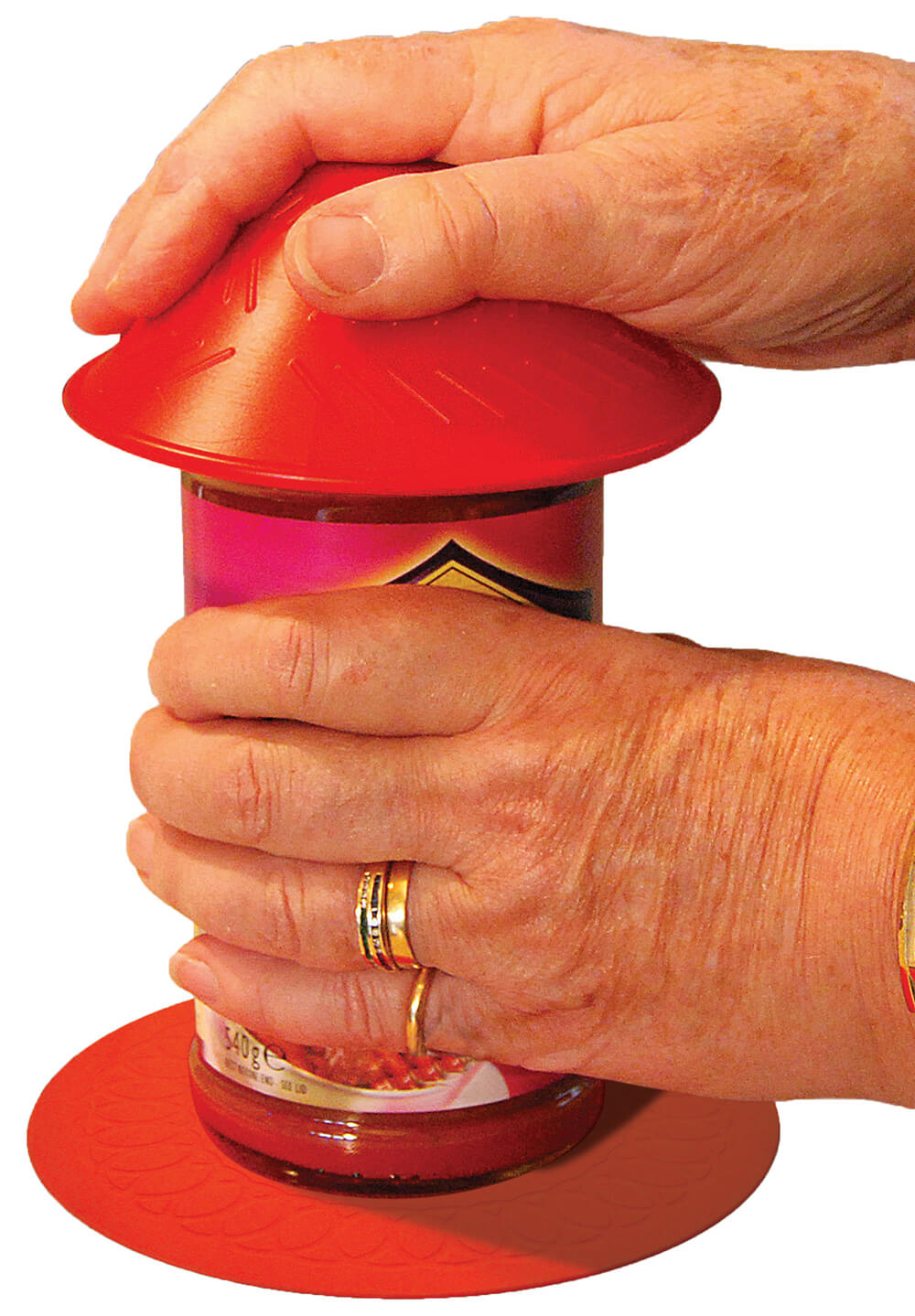
Regaining Independence in Daily Living Occupational therapists often work with patients to improve their activities of daily living (ADLs). Tenura jar and bottle openers can be valuable tools in this process, aiding patients with weak grip strength or limited hand mobility. These openers provide a firm grip on lids and caps, making it easier for patients to open containers and bottles independently. Empowering patients to perform everyday tasks can boost their self-esteem and enhance their overall well-being.
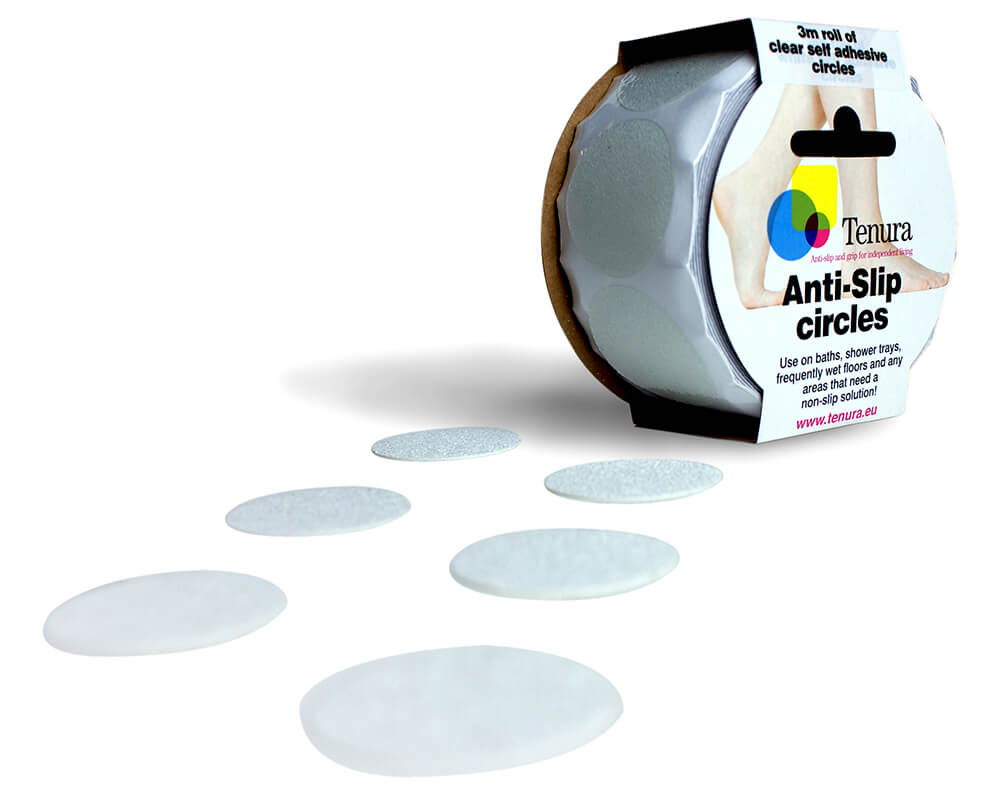 Non-Slip Bath & Shower Stickers
Non-Slip Bath & Shower Stickers
Promoting Safety and Confidence Safety is a top priority during rehabilitation, especially in the bathroom. Tenura's non-slip bath and shower stickers offer a practical solution for preventing slips in wet and slippery environments. Occupational therapists can recommend these stickers to patients, allowing them to shower and bathe with increased confidence. Enhanced bathroom safety can alleviate anxiety and encourage patients to maintain their personal hygiene routines without fear of accidents.
Tenura Grip Strips for Mobility Aids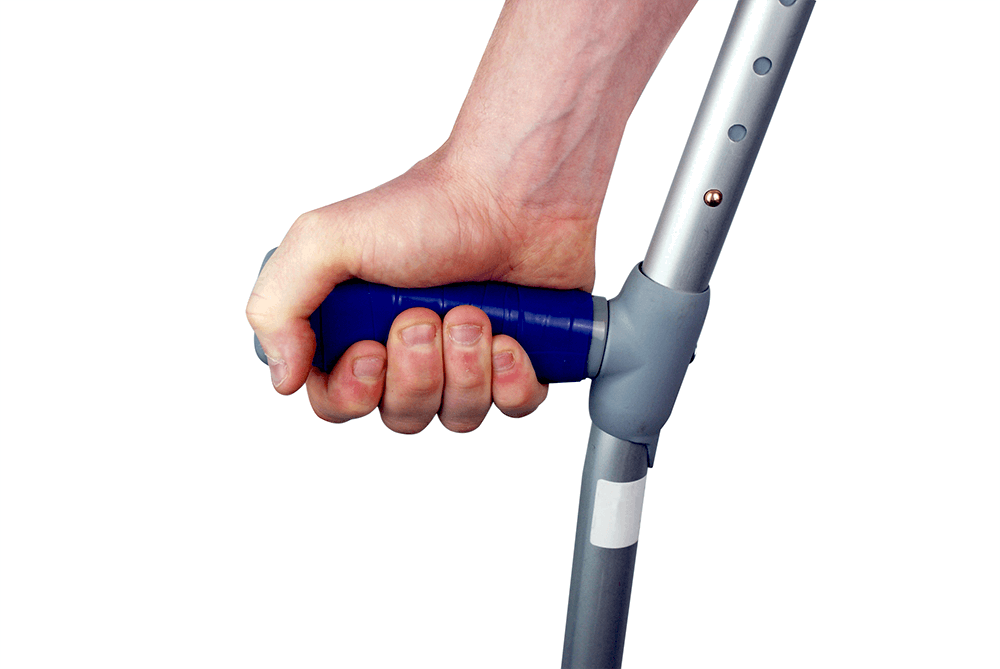
Secure and Steady Support Many patients rely on mobility aids such as canes, walkers, and wheelchairs during their recovery process. Tenura grip strips can be applied to these aids to enhance grip and stability. The non-slip surface helps prevent the mobility aid from slipping on smooth or uneven surfaces, enabling patients to move around more confidently. For individuals transitioning from using assistive devices to walking independently, these grip strips can facilitate a smoother journey towards increased mobility.
Tenura's range of anti-slip products offers valuable support to occupational therapists and their patients during physical therapy and rehabilitation. From grip rolls for therapeutic exercises to non-slip floor mats for fall prevention, Tenura equips therapists with versatile tools to enhance patient safety and independence. By incorporating Tenura products into rehabilitation programs, therapists can create a secure and empowering environment that fosters patients' recovery and mobility.
If you're an occupational therapist or healthcare professional, consider adding Tenura products to your toolkit to provide comprehensive support and care for your patients. Together, we can promote safer and more successful rehabilitation journeys, improving the lives of those on the path to recovery.
Typical Placemats Vs Tenura Placemats
When it comes to choosing placemats for your dining table, the options seem endless. From paper and cloth to stone and silicone, each material offers its own set of advantages and disadvantages. However, in recent years, silicone placemats, particularly those from Tenura, have gained popularity for their unique properties and benefits. In this blog post, we'll compare typical placemats to Tenura Placemats across various factors to help you make an informed decision.
 Environmental Impact:
Environmental Impact:
Typical Placemats: Paper and cloth placemats are often disposable or require frequent washing, leading to increased waste and water consumption. Stone placemats, while durable, may involve mining processes that can have significant environmental consequences.
Tenura Placemats: Tenura Placemats are made from high-quality silicone, a material known for its durability and recyclability. Unlike disposable options, Tenura Placemats are reusable, reducing the environmental footprint associated with single-use placemats.
Aesthetics:
Typical Placemats: Paper placemats offer a variety of designs and patterns but may lack durability. Cloth placemats provide a classic look and feel but can be prone to staining over time. Stone placemats offer a natural, rustic aesthetic but may not suit every dining table.
Tenura Placemats: Tenura Placemats combine functionality with sleek, modern design. Available in a range of colours and styles, they complement any table setting while offering the benefits of silicone, such as a non-slip grip and easy cleaning.
Toxicity:
Typical Placemats: Paper and cloth placemats are generally safe but may contain dyes or chemicals that could leach into food. Stone placemats are considered safe but may harbour bacteria if not properly cleaned and sanitized.
Tenura Placemats: Made from 100% silicone, Tenura Placemats are non-toxic and free from harmful chemicals such as BPA, PVC, and phthalates. They provide a safe dining surface for you and your family.
 Price:
Price:
Typical Placemats: Paper and cloth placemats are often inexpensive but may need frequent replacement. Stone placemats can be more expensive upfront but may offer better long-term value due to their durability.
Tenura Placemats: While Tenura Placemats may have a higher initial cost compared to disposable options, their durability and reusability make them a cost-effective choice in the long run.
Durability:
Typical Placemats: Paper placemats are disposable and have limited durability. Cloth placemats may fray or fade over time with repeated use and washing. Stone placemats are durable but may chip or crack with heavy use.
Tenura Placemats: Tenura Placemats are exceptionally durable and resistant to tearing, fading, and degradation. They maintain their non-slip properties even after prolonged use and are dishwasher safe for easy maintenance.
Size Options:
Tenura Placemats are available in the following sizes and weights:
25cm x 18cm | 76g
35cm x 25cm | 141g
45cm x 38cm | 306g
 Applications:
Applications:
Tenura Placemats have a wide range of uses beyond the dining table:
Prevent plates, bowls, and crockery from sliding on tables, counters, and trays.
Hold chopping boards in position for safer food preparation.
Secure kitchen appliances and mixing bowls in place during use.
Keep objects firm on surfaces that are not horizontal and/or are subject to motion or tipping.
Provide a safe resting place for hot pans on table mats, indicating to others that the pans are hot.
What is the Use of a Placemat?
A placemat is used to protect a dining table's surface from spills, stains, and heat damage while also enhancing the table's aesthetic appeal. It provides a designated area for placing dinnerware and serves as a barrier between the table and the dishes.
Why Do You Need Placemats?
Placemats serve multiple purposes, including protecting the dining table from damage, adding decorative elements to the table setting, and helping to define each diner's personal space during a meal. They also make cleaning up spills easier and can prevent dishes from sliding on the table.
What is the Difference Between a Table Mat and a Placemat?
The terms "table mat" and "placemat" are often used interchangeably, but there can be ever so slight differences in their usage. Generally, a placemat is a smaller, individual mat placed at each diner's setting, while a table mat refers to a larger mat placed in the centre of the table to protect the entire surface.
While typical placemats offer a range of options, Tenura Placemats stand out for their superior performance across various factors. From their eco-friendly composition to their stylish design and long-lasting durability, Tenura Placemats provide a reliable solution for enhancing your dining experience. Consider making the switch to Tenura Placemats for a practical and sustainable dining solution.
Giving Back to Disability Schools & Occupational Therapists.
At Tenura, we believe in the power of giving back and making a positive impact in our communities. That's why we're thrilled to announce a special giveaway event dedicated to supporting occupational therapists and disability schools. As part of our commitment to enhancing the lives of individuals with disabilities, we're offering a selection of our high-quality daily living aid products to help occupational therapists in their daily practice and provide essential aids for disability schools. Join us as we strive to make a difference and empower those who dedicate their lives to improving the lives of others.
 Children's Anti-Slip Mats for Disability Schools
Children's Anti-Slip Mats for Disability Schools
We understand how important it is to create safe and accessible environments for children with disabilities, especially in educational settings. That's why we're thrilled to offer our children's anti-slip mats to disability schools as part of this giveaway event. These mats are specially designed to provide stability and prevent slips and falls, ensuring a secure and comfortable learning environment for children with mobility challenges.

Bottle Openers for Occupational Therapists
Occupational therapists are extremely important in helping individuals regain independence and improve their quality of day to day life. To support their efforts, we're also giving away our innovative bottle openers designed to assist individuals with limited hand strength or dexterity. These bottle openers are ergonomic and easy to use, making them an essential tool for occupational therapists working with clients who face challenges in daily tasks.
How to Participate
Participating in our giveaway event is simple! Occupational therapists and disability schools interested in receiving these free products can fill out our contact form on our website. Simply provide your contact information and a brief description of how these products would benefit your practice or institution. We'll review all submissions and select recipients based on their specific needs and the impact these products can have on their work.
Contact Us
If you're an occupational therapist or represent a disability school and would like to learn more about our giveaway event or how Tenura Daily Living Aids can support your practice or institution, please don't hesitate to contact us. Our sales team is available to answer any questions you may have and assist you in accessing the products that best suit your needs. Reach out to us today to learn more about how we can partner with you in making a positive impact in the lives of individuals with disabilities.
At Tenura, we're dedicated to supporting occupational therapists and disability schools in their important work of improving the lives of individuals with disabilities. Through our giveaway event, we aim to provide essential aids that enhance safety, accessibility, and independence for those in need. We're excited to partner with occupational therapists and disability schools to make a positive impact in the lives of others.
Stay Connected
To stay updated on future events, product releases, and helpful resources, be sure to connect with us on social media and subscribe to our newsletter. Together, with you behind us, we can continue making a difference in the lives of individuals with disabilities.
Improve grip for homeware handles to maintain an independent lifestyle.
In the realm of daily living aids, small enhancements can have a profound impact on comfort and usability. Tenura, a leading provider of Daily Living Aid products, introduces anti-slip strips in both strips and rolls, available in two versatile colours: blue and red. These strips not only transform the grip on homeware handles but also offer easy cleaning and maintenance, ensuring a seamless and effective solution.
Handling homeware items like kettles, mugs, and vacuum cleaners becomes an easy experience with Tenura's anti-slip strips. The strips, offered in vibrant blue and red, go beyond traditional solutions by adding a touch of personalisation to improve independent daily activities.
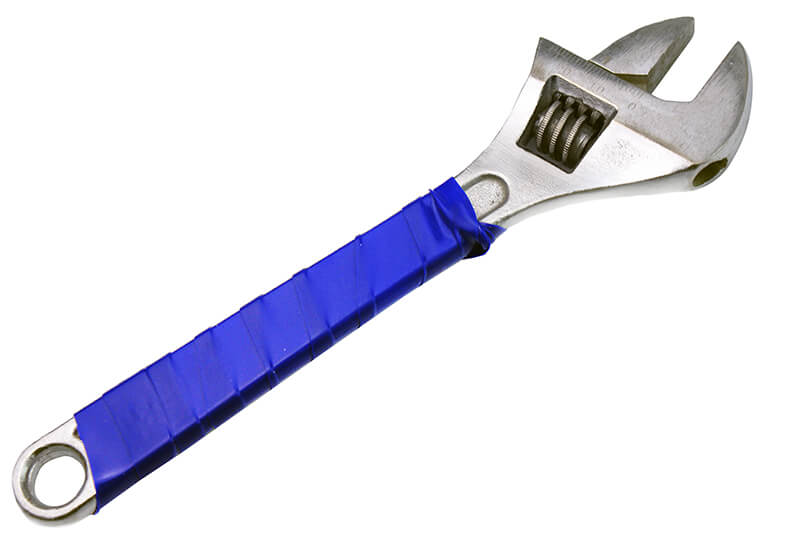 What Are The Best Strips for Tool Handles?
What Are The Best Strips for Tool Handles?
When it comes to enhancing the grip on tool handles, Tenura's anti-slip strips stand out as the top choice. Their durable composition, easy application, and consistent non-slip properties make them the ideal solution for various tools. From garden tools to hand tools, the versatility of these strips ensures a secure and comfortable grip in every application.
Tenura's commitment to user-friendly solutions is evident in the easy application of anti-slip strips. Simply adhere them securely to handles and experience an enhanced grip that remains effective even after cleaning. The strips maintain their non-slip properties, ensuring a consistent and reliable performance.
How Do I Use Grip Strips?
Using Tenura's grip strips is a straightforward process that yields significant results. Start by cleaning the handle thoroughly to ensure proper adhesion. Then, apply pressure and wrap it securely around the handle. Press down to ensure a firm grip. The versatility of these strips allows users to adapt them to various handle shapes and sizes, making them a practical and customisable solution.
The unique composition of Tenura's anti-slip strips provides a non-intrusive yet durable solution. With increased friction and a secure hold, the strips showcase their effectiveness in daily activities. The easy-to-clean nature of these strips adds to their appeal, making them a practical and hygienic choice for homeware applications.
Imagine enjoying a hot cup of tea with unwavering confidence, knowing that your mug is secure in your hands. The application of anti-slip strips elevates these seemingly mundane activities, highlighting their effectiveness in enhancing comfort and usability, all while offering the convenience of easy cleaning.
The versatility of anti-slip strips extends across a spectrum of homeware items. From kitchen utensils to garden tools, the strips contribute to a safer and more enjoyable experience with everyday items. Tenura's range of anti-slip strips, available in two colours, empowers users to tailor their approach, adding a personal touch to their homeware.
In conclusion, the effectiveness of anti-slip strips in homeware applications is not only about transforming grip but also about personalisation and practicality. Tenura's commitment to offering these strips in vibrant colours, coupled with their easy cleaning and maintenance properties, ensures that users can enjoy the full potential of their homeware without compromise. Elevate your daily living experience with the assurance of improved grip, personalisation, and enhanced usability through Tenura's anti-slip solutions.
How to Choose a Pet That is Suitable for the Disabled
Choosing a pet can be a joyful and rewarding experience for anyone, but for individuals with disabilities, the process requires extra consideration. It's essential to select a pet that not only brings companionship and joy but also suits the specific needs and abilities of the disabled person. In this guide, we'll explore some key factors to keep in mind when choosing a pet for a disabled individual, along while discussing the best pets for disabled.
1. Consider the Physical Abilities of the Individual 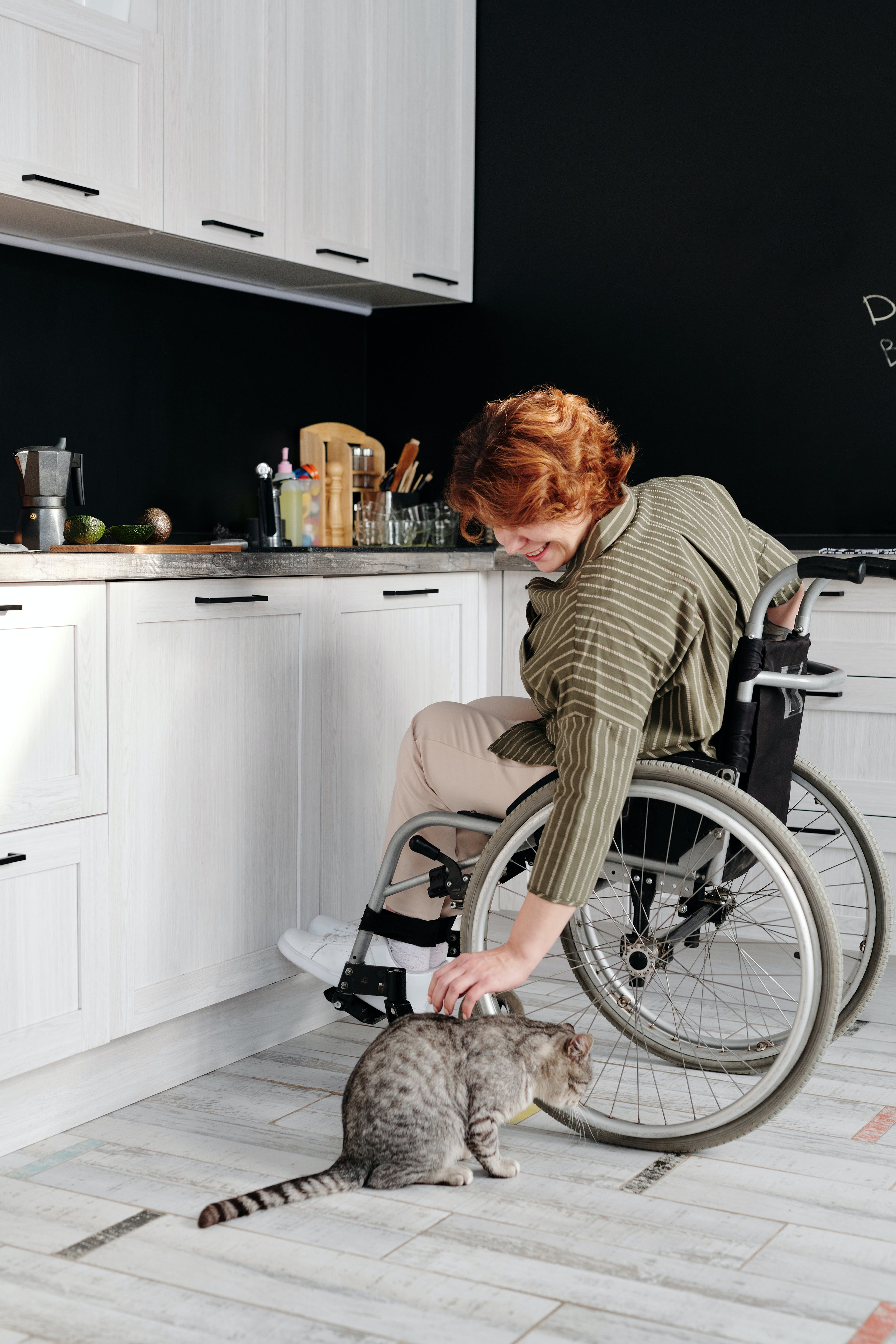
The first and most crucial step in choosing a pet for a disabled individual is to assess their physical abilities. Different disabilities have varying impacts on mobility and strength. For someone with limited mobility, a small and low-maintenance companion like a cat or a small dog may be a suitable choice. In contrast, individuals with more mobility may be able to care for larger dogs, which can offer both companionship and assistance.
2. Allergies and Sensitivities
People with disabilities might have allergies or sensitivities that can be triggered by pet dander, fur, or feathers. It's vital to consider these factors when choosing a pet. Hypoallergenic breeds or non-allergenic animals like reptiles and fish may be more appropriate for individuals with allergies or respiratory issues.
3. Energy Levels
The energy level of the pet should match the energy levels and abilities of the disabled person. High-energy dogs may be too demanding for someone with limited mobility. In such cases, consider lower-energy dog breeds or cats. Turtles, tortoises, or certain bird species can also be great options for people with a more laid-back lifestyle.
4. Training and Temperament
When choosing a pet for someone with a disability, it's important to consider the pet's temperament and its training requirements. Well-behaved, easy-to-train pets are often a better fit. Look for pets that are known for their gentle and patient nature, as these characteristics can make the pet-owner relationship more enjoyable and less stressful.
8. Financial Considerations
Owning a pet comes with financial responsibilities. It's important to consider the cost of food, veterinary care, grooming, and other pet-related expenses. Make sure that the individual or their support network can handle these costs comfortably. Although some health service providers can provide guide dogs which can assist you in areas of your disability.
6. Maintenance and Care
Consider the level of care and maintenance that the chosen pet will require. Disabled individuals might have varying levels of ability to care for their pets independently. Assess whether the individual can groom, feed, and clean up after the pet. If assistance is required, make sure there is a support system in place, with the Tenura product range we can help improve the maintenance for you and your companions with our range of daily living aids!
7. Housing and Space
Take into account the living situation of the disabled individual. Do they live in an apartment, a house, or a care facility? The available space will influence the choice of a pet. Smaller living spaces may be more suitable for cats, small dogs, or small mammals, whereas larger spaces can accommodate bigger dogs or even livestock in some cases.
8. Assistance Animals
Some disabled individuals require assistance animals to help with daily tasks. Service dogs, for instance, can be trained to perform tasks like fetching dropped items, opening doors, or providing emotional support. Ensure that you consult with a reputable service animal organisation to select and train a service dog that meets the specific needs of the disabled person.
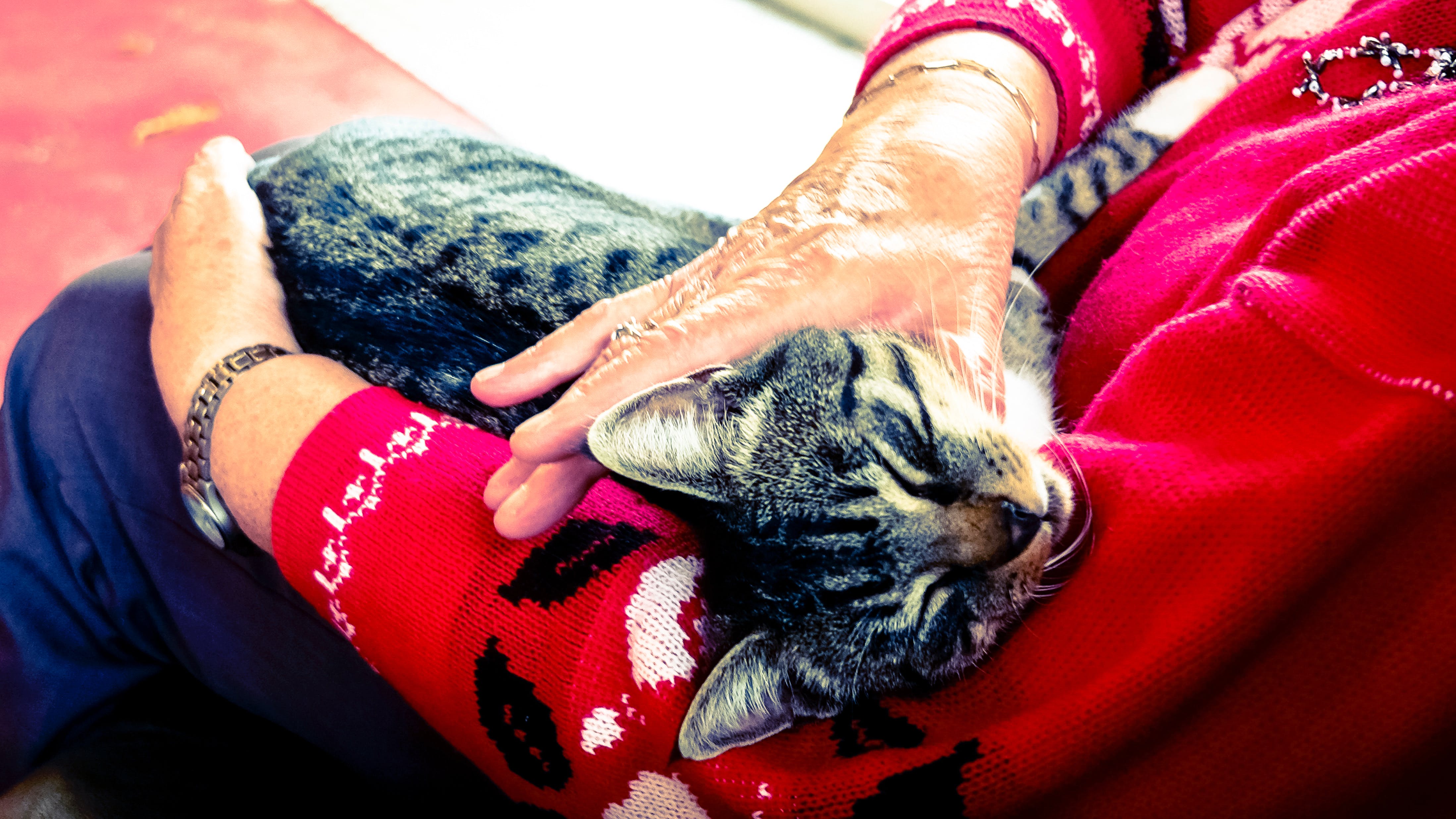
What Animals Can Be Used to Help The Disabled?
Cats and dogs are the most common animals used to assist people with disabilities. Dogs are highly versatile and can be trained to aid those with various disabilities, such as visual impairments, mobility challenges, and medical conditions like epilepsy or diabetes. Service dogs provide essential support by guiding their owners, retrieving items, and even alerting them to impending medical emergencies. Cats, although less commonly known as service animals, can offer valuable emotional support to individuals with disabilities. Their calming presence, companionship, and intuitive understanding of their owners' needs can be incredibly comforting. While dogs take on more active roles in assistance, cats excel in providing solace and emotional stability, making them essential companions for those with disabilities.
Can Animals Sense Disability?
Animals have a remarkable ability to sense disabilities in humans. Their acute senses and intuition enable them to detect physical and emotional changes in individuals. Many heartwarming stories and scientific studies have highlighted the incredible bond between animals and people with disabilities. Whether it's a service dog assisting someone with mobility challenges or a pet offering emotional support, these companions have an uncanny ability to understand and provide comfort to those in need. This unique connection between animals and individuals with disabilities is a testament to the profound sensitivity and empathy that our animal friends possess.
What Is The Best Dog Breed for Someone With a Disability?
When it comes to dog breeds for people with disabilities, several factors come into play. For individuals with mobility challenges, Labrador Retrievers, Golden Retrievers, and German Shepherds are often recommended as they are not only intelligent but also known for their gentle and helpful nature. However, the best dog breed ultimately depends on the specific needs and lifestyle of the disabled person. It's crucial to consult with a professional dog trainer or service dog organisation to make the right choice.
Choosing a pet for a disabled individual involves thoughtful consideration of their unique needs and abilities. The right pet can provide companionship, emotional support, and even assistance with daily tasks. By taking into account factors such as the individual's physical abilities, allergies, energy levels, temperament, and living situation, you can make a well-informed choice that will bring joy and fulfilment to both the person with a disability and their new furry or scaly friend. Learn more about animal therapy by reading our other blog.
If you're in need of daily living aids for a disabled individual, Tenura offers a range of high-quality products to improve daily life. To explore our offerings, please visit Tenura’s website.
Remember, the most crucial aspect of choosing a pet for someone with a disability is ensuring that the pet enhances their life, provides companionship, and supports their specific needs. Always consider the individual's comfort, safety, and happiness when making this important decision.
Tenura - Celebrating Purple Tuesday
What Is Purple Tuesday?
Purple Tuesday 2023, celebrated on the second Tuesday of November, is a global movement aimed at making businesses and organisations more accessible and inclusive for individuals with disabilities. At Tenura, we are dedicated to championing this cause. In this blog post, we'll explore the significance of Purple Tuesday, our commitment to accessibility, and how we're working towards a more inclusive world.
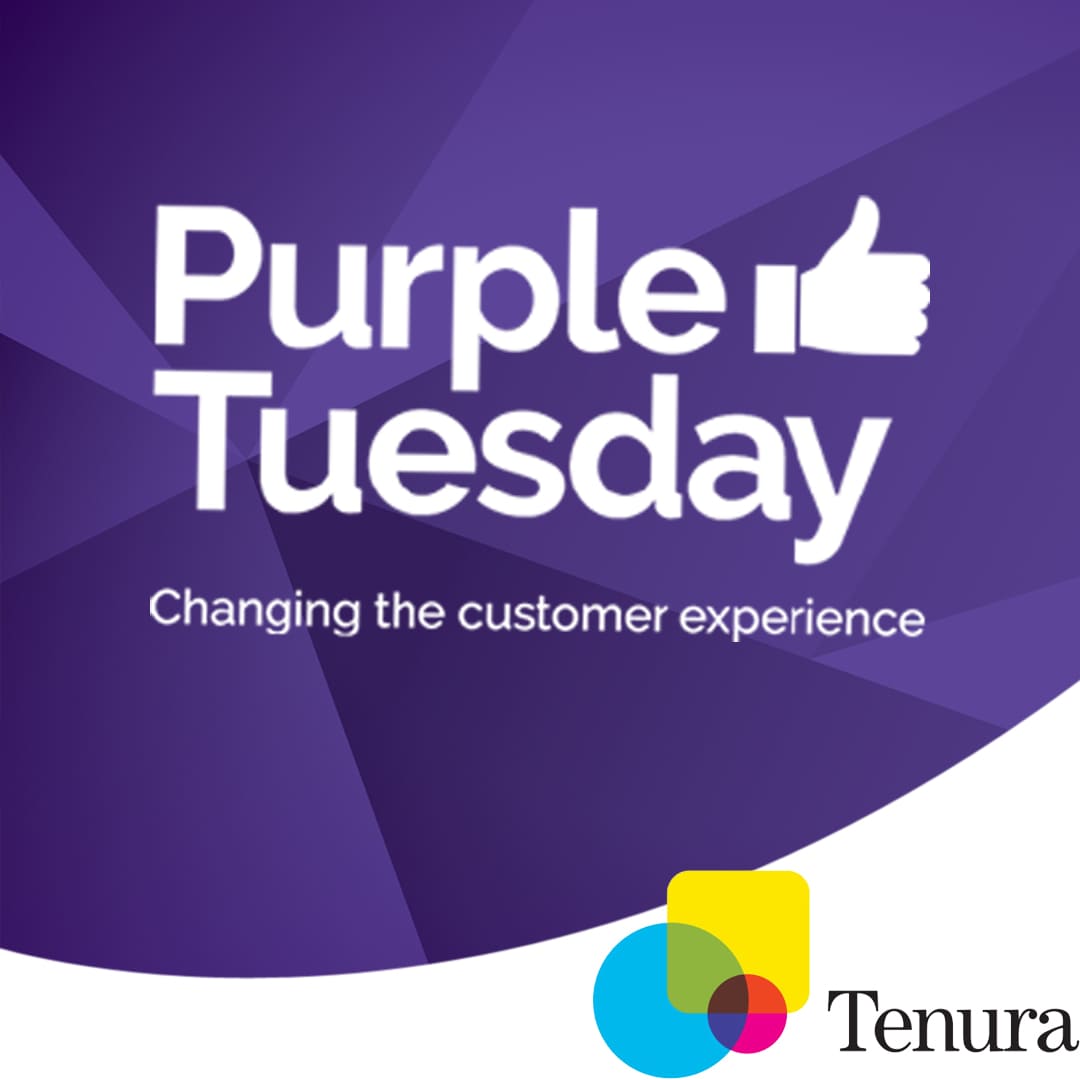
Why Purple Tuesday Matters:
Purple Tuesday is more than just a day on the calendar; it's a reminder of the essential role of accessibility and inclusivity in our society. It calls upon businesses to prioritise inclusivity and disability awareness to provide equal opportunities for all, regardless of their abilities or disabilities.
Tenura's Commitment:
At Tenura, we understand the importance of creating a world where everyone has equal access and opportunities. Our dedication to this cause goes beyond a single day, but Purple Tuesday serves as an annual milestone to reaffirm our commitment. Here are some of the steps we've taken and continue to take to support this mission:
- Accessible Products: We design and provide a range of innovative, anti-slip and grip-enhancing products that make everyday tasks more accessible for individuals with limited hand strength or mobility challenges.
- Educational Resources: We offer educational materials, tips, and guides to help individuals and caregivers create safer and more accessible living environments.
- Community Engagement: We collaborate with organisations and communities focused on accessibility and inclusivity, sharing insights and experiences to contribute to positive change.
- Feedback and Improvement: We actively seek feedback from our customers, users, and partners to improve our products and ensure they meet the evolving needs of the disability community.
Inclusivity for All:
Our vision is to empower individuals with disabilities, offering products and resources that enhance their daily lives and foster a sense of independence. By creating accessible solutions, we aim to remove the obstacles that limit opportunities and ensure that everyone can participate fully in their chosen activities and experiences.
As we observe Purple Tuesday, we recommit ourselves to the values of inclusivity and accessibility. At Tenura, our mission is to empower individuals and communities to lead fulfilling lives without limitations. Together, we can build a world where everyone, regardless of their abilities, can thrive. Join us on this journey, and let's make inclusivity an everyday reality.
Stay tuned for more updates, resources, and initiatives from Tenura as we work together for a more inclusive and accessible future.